The relationship between words and music is perhaps one of the most complex and oft-discussed questions in the world of art. The two come together most often on the operatic stage, where, in order to create a complete work of art, the text and music must be meshed together perfectly, like a tightly-woven cloth. The 2012-2013 seasons of the New Israel Opera will contemplate this relationship with a series of operas based on some of the masterpieces of world literature.
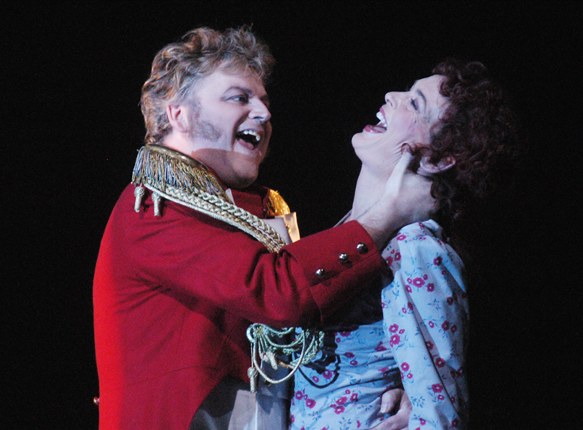
The season will open with Alban Berg’s first opera, Wozzeck (first performed in 1925). The opera is based on Georg Büchner’s play Woyzeck, which is the story of a young soldier leading an unsatisfying life, which finally unravels as he spirals into madness. The play in turn is partially based on the story of an actual soldier from Leipzig who was executed for the murder of his lover. It is a deep human tragedy that deals with personal jealousies as well as the cruelties of society and the hardships of the lower classes. The music of Wozzeck incorporates the musical elements of the early twentieth century, and is a prime example of atonality in opera and the influence of Arnold Schoenberg. Berg makes use of leitmotifs instead of arias to depict the complex characters.
Though Wozzeck is Berg’s first opera, it was Büchner’s last play, left incomplete at his death in 1837, when he was only 23 years old. In honor of Büchner’s 200th birthday, the Israel Opera will team up with the Cameri Theater for a special lecture on the similarities and differences between the play and its operatic adaptation. The panel of speakers will include conductor David Stern, music director of the Israel Opera, actor and director Itay Tiran, director Manfred Beilharz, who will direct the opera, and the soloists and actors of both versions. The event will be hosted at the opera house on Saturday, November 24 at 11:00.
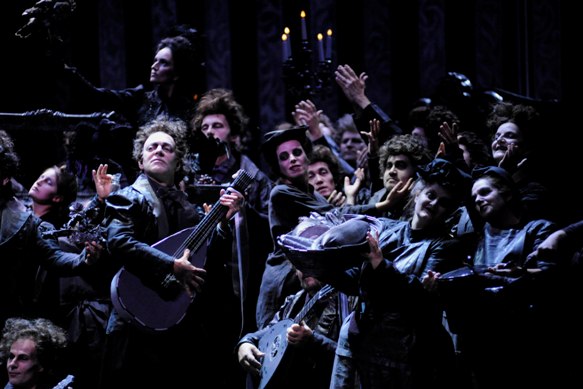
Wozzeck will be followed by a brand-new production of Verdi’s Luisa Miller, based on Friedrich Schiller’s play Kabale und Liebe (“Intrigue and Love”). The opera includes many of Italian opera’s most well-known arias and duets, such as Sacra la scelta è d’un consorte, Ah, fu giusto il mio sospetto and Quando le sere al placido. Like the characters of Wozzeck, star-crossed lovers Luisa Miller and her lover Rodolfo do not stand a chance against the harsh machinations of an unforgiving class society. The new production, which will be conducted by Daniel Oren, promises to be a spellbinding retelling of the classic opera.
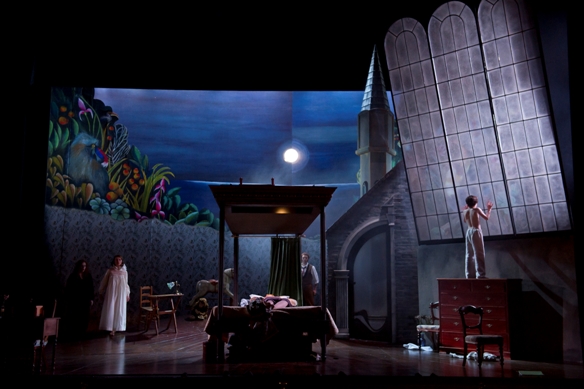
Next on the Israel Opera’s calendar will be Benjamin Britten’s operatic adaptation of The Turn of the Screw, the complex and compelling novella by Henry James. The opera libretto was written by Welsh librettist Myfanwy Piper, and maintains the gripping drama of the original text. The opera is sung in English and contains references to sources of English literature, from W.B. Yeats’ “The Second Coming” to traditional nursery rhymes – which are quoted not only in the text but also in the music. The novella’s literary significance mirrors the musical intricacies of the opera, which, like Berg’s Wozzeck, was influenced by the ideas of Schoenberg. The Turn of the Screw is another new production at the Israel Opera, directed by South African director Alessandro Talevi.
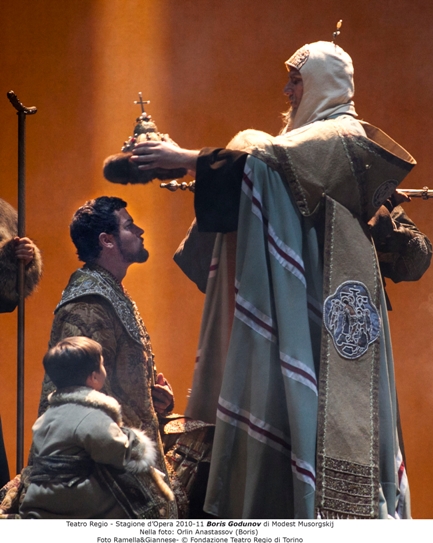
After The Turn of the Screw, the Opera will stage a new production of Boris Godunov, Mussorgsky’s 1872 opera. The historical Boris Godunov was Tsar of Russia from 1598 to 1605, during a period of anarchy, usurpation and social unrest. The libretto, which was written by the composer, is based on Pushkin’s 1831 play of the same name. Pushkin’s text is written in blank verse, which Mussorgsky tried to assimilate into the opera. He revised the script and the score several times until the opera was staged, and now it has become one of the most performed Russian operas around the world. Keri-Lynn Wilson will conduct this production, which will star world-famous bass Paata Burchuladze.
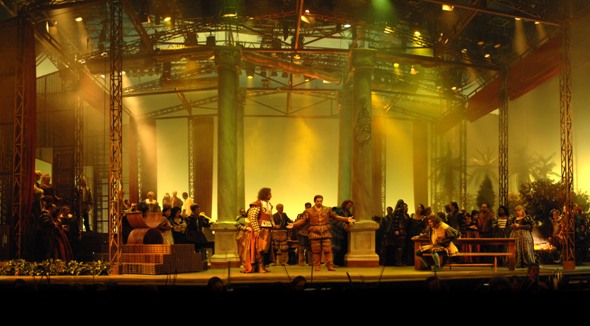
After Boris Godunov will be another story of rulers and political intrigues: Verdi’s Otello (1887). Written at the end of his career, Otello is one of three Verdi operas based on Shakespeare: others include Falstaff (his last opera) and Macbeth. Verdi was known for his determination to remain true to Shakespeare’s texts, and his Otello is far more loyal to its source than Rossini’s earlier version. The score contains some of the most famous musical compositions in history, and ranges from the pathos and tenderness of Desdemona’s Willow Song and Otello’s final farewell to the powerful climax of Iago and Otello’s tremendous jealous rage in the Act II duet, Si, pel ciel. This too will be a new production at the Israel Opera, directed by Stefano Mazzonis di Pralafera.
No opera season is complete without classics such as Verdi’s La Traviata. Yet another treat for Verdi lovers, this opera contains some of the most famous music in the world, such as the Act I Drinking Song, Libiamo ne’ lieti calici. Literally translated as “The Fallen Woman”, La Traviata is the story of the doomed love between Alfredo, a bourgeois gentleman, and Violetta, a Parisian courtesan who sacrifices all for Alfredo before she ultimately succumbs to tuberculosis. The opera is based on La Dame aux Camélias, the 1848 novel by Alexander Dumas, fils, which was adapted as a play by the author before Verdi composed the opera in 1853. The title character (named Marguerite Gautier in the novel and play) was actually based on Dumas’ lover, Marie Duplessis, who died of tuberculosis at age 23. Whether she be called Violetta, Marguerite or Marie, the story of the Lady of the Camellias has been told and retold on the stage and on the film screen, and Verdi’s depiction of Parisian life and the social misconceptions that doom Violetta continue to move audiences again and again.

The opera season will end with the most exciting musical event of the year: the Bolshoi Opera’s first visit to Israel. The respected guests will bring their magnificent production of Tchaikovsky’s Eugene Onegin, also based on a novel in verse by Pushkin. There are no regents and rulers in this opera, only a young Russian dandy whose recklessness and self-interest rob him of his one chance at happiness and love. Pushkin’s text exemplifies some of the most important elements of the Russian poetic style, and the opera is considered one of the world’s greatest compositions of all time. The music, particularly the dances, has become standard repertoire around the world.
Opera enthusiasts and lovers of literature will definitely enjoy this season at the New Israel Opera. In order to understand the relationship between each opera and its respective source, be sure to attend Saturday morning “Towards Opening” lectures, which feature a discussion panel of some of the artists involved in the production, led by the Opera’s artistic director, Michael Ajzenstadt, as well as a sneak peek at some of the singers. Also, some of the performances will be followed by a chat with the soloists (free and open to the public). Operagoers who arrive early can take a backstage tour, free of charge to ticketholders, an hour before the show.
Tickets can be ordered via the Israel Opera’s website, or their phone number: 03-6927777.




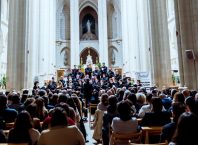

I like this weblog so much, saved to favorites. “Nostalgia isn’t what it used to be.” by Peter De Vries.
Comments are closed.